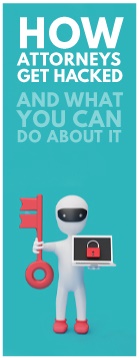How Attorneys Get Hacked (And What You Can Do About It)
Credit Available - See Credits tab below.
Total Credits: 1 Alaska, 1 Arizona, 1 Colorado, 1 Idaho, 1 Michigan, 1 Montana, 1 North Dakota, 1 South Carolina, 1 South Dakota, 1 Vermont, 1 Washington, 1 Wyoming
- Average Rating:
- 62
- Categories:
- Cybersecurity
- Faculty:
- Sherri Davidoff
- Duration:
- 1 Hour
- Format:
- Audio and Video
- Original Program Date:
- Sep 14, 2021
- License:
- Access for 3 month(s) after purchase.
Description
Professional hackers around the world are targeting attorneys, regardless of firm size, in attempts to gain access to confidential information, financial accounts, and other valuable data. Attorneys hold large amounts of sensitive data, and as a result, face a daily barrage of cyberattacks. In this fast-paced talk, Sherri will use screenshots and videos of an actual attack in order to demonstrate how attackers break into attorneys’ computer systems. Then, she’ll go over how a law firm can build a strong defense against these attackers, running through the most important building blocks of a strong cybersecurity program in order to give attendees an understanding of what they can do to effectively defend their law firm, their client data, and other valuable assets against cyberattacks.
Under various states’ rules of professional conduct, lawyers have an ethical obligation to protect their clients’ information and files and attention should be paid to the benefits and risks associated with relevant technology. The greatest risk lawyers face today with the use of technology is the possibility of their systems being hacked by cybercriminals (by ransomware or other means) to gain access to sensitive data to hold for ransom payments. Confidentiality rules state that a lawyer shall make reasonable efforts to prevent the inadvertent or unauthorized disclosure of, or unauthorized access to, client information. This cybersecurity course is designed to teach lawyers the necessary steps they need to take to avoid becoming a victim of a cyberattack. This addresses the very core of what the rules of professional conduct require.
Credits
| General Credits | Ethics Credits |
| 1 | 1 |
| General Credits | Ethics Credits |
| 1 | 1 |
| General Credits | Ethics Credits |
| 1 | 1 |
| General Credits | Ethics Credits |
| 1 | 1 |
| General Credits | Ethics Credits |
| 1 | 1 |
| General Credits | Ethics Credits |
| 1 | 1 |
| General Credits | Ethics Credits |
| 1 | 1 |
| General Credits | Ethics Credits |
| 1 | 1 |
| General Credits | Ethics Credits |
| 1 | 1 |
| General Credits | Ethics Credits |
| 1 | 1 |
| General Credits | Ethics Credits |
| 1 | 1 |
| General Credits | Ethics Credits |
| 1 | 1 |
Handouts
| How Attorneys Get Hacked Attendee Handout (19.3 MB) | 14 Pages | Available after Purchase |
Faculty

Sherri Davidoff Related Seminars and Products
Founder
LMG Security
Sherri Davidoff is the CEO of LMG Security, as well as a noted speaker, trainer, white hat hacker and author of the recently released book, “Data Breaches: Crisis and Opportunity.” As a recognized expert in cybersecurity and data breach response, Sherri has been called a "security badass" by The New York Times. She has conducted cybersecurity training for many distinguished organizations, including the Department of Defense, the American Bar Association, FFIEC/FDIC, and many more. She is a faculty member at the Pacific Coast Banking School, and an instructor for Black Hat, where she teaches her “Data Breaches” course. She is also the co-author of Network Forensics: Tracking Hackers Through Cyberspace (Prentice Hall, 2012), a noted security text in the private sector and a college textbook for many cybersecurity courses. Sherri is a GIAC-certified forensic examiner (GCFA) and penetration tester (GPEN) and holds her degree in Computer Science and Electrical Engineering from MIT. She has also been featured as the protagonist in the book, Breaking and Entering: The Extraordinary Story of a Hacker Called “Alien”.
Reviews
| 5 |
|
| 4 |
|
| 3 |
|
| 2 |
|
| 1 |
|





